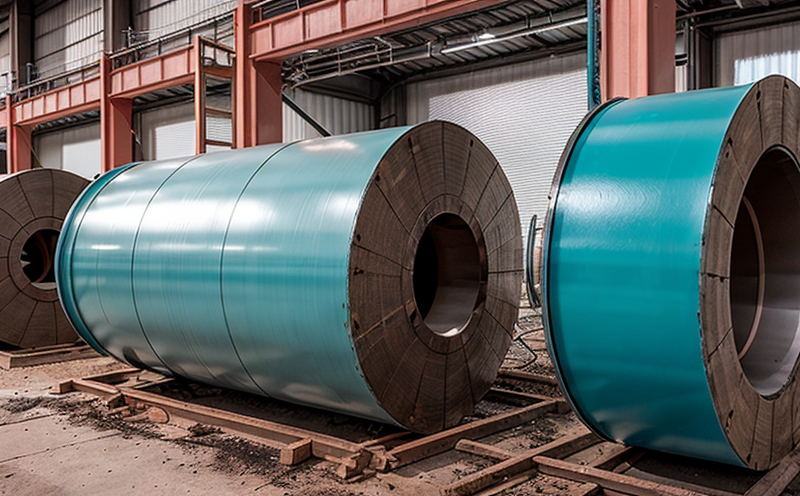ISO 1519 Mandrel Bend Durability Testing of Coatings
The ISO 1519 Mandrel Bend Test is a standardized procedure designed to evaluate the durability and adhesion of coatings applied to materials. This test simulates real-world conditions that can lead to coating failure, such as mechanical stress from bending or flexing.
This type of testing is critical in industrial manufacturing and processing where coatings are used on metal substrates. The test involves applying a force through the application of a mandrel (a cylindrical bar) which bends the specimen around it at a defined angle under controlled conditions. The primary objective is to assess whether the coating will peel or crack after undergoing repeated bending cycles.
The ISO 1519 standard specifies parameters such as the material and size of the mandrel, the angle of bend, and the number of cycles required for the test. It also provides guidelines on specimen preparation, including cleaning methods and surface treatment techniques to ensure consistent results across different samples.
Understanding these aspects is crucial for quality managers, compliance officers, R&D engineers, and procurement specialists involved in ensuring product integrity and longevity. The test helps manufacturers identify potential weaknesses in their coating systems early in the development process or during quality assurance checks before finalizing products for market release.
The ISO 1519 Mandrel Bend Test is particularly useful in sectors like automotive manufacturing, aerospace engineering, and construction materials where high-performance coatings are essential. By incorporating this test into their quality control protocols, companies can maintain rigorous standards of product reliability and durability.
Real-world applications often involve complex scenarios where multiple factors contribute to coating failure. For instance, in the automotive industry, a car door handle might experience repeated flexing due to temperature changes or user interaction. Understanding how the coating performs under these conditions is vital for preventing premature failures that could compromise safety and customer satisfaction.
Similarly, in aerospace applications, structures must withstand extreme environmental stresses while maintaining optimal performance over extended periods. Evaluating coatings using ISO 1519 ensures that they can endure such challenges effectively, enhancing overall system reliability.
From an engineering perspective, the test allows for precise control over variables like mandrel diameter, bend angle, and cycle count to simulate specific use cases accurately. This level of customization enables more accurate assessments tailored specifically to each manufacturer's needs or industry requirements.
The outcome of this testing process provides valuable insights into coating adhesion strength and flexibility properties which are key indicators of overall product quality. With this information, manufacturers can make informed decisions regarding material selection, application techniques, and post-production inspection procedures.
Industry Applications
| Industry Sector | Application |
|---|---|
| Aerospace Manufacturing | Evaluation of protective coatings on aircraft structures to ensure they can withstand environmental stressors during flight. |
| Automotive Industry | Durability assessment of automotive components such as bumpers or exhaust systems where repeated bending may occur during use. |
| Agricultural Equipment Manufacturing | Testing coatings on farm machinery parts exposed to harsh weather conditions and frequent flexing due to operation. |
| Construction Materials | Evaluation of coatings used in structural components like beams or rebar which may experience bending during construction processes. |
| Medical Device Manufacturing | Assessment of coating adhesion on devices intended for sterilization and long-term use, ensuring they retain their integrity under repeated sterilization cycles. |
| Electrical & Electronic Equipment Manufacturing | Durability testing of circuit boards or other electronic components coated to protect against moisture ingress and mechanical damage during assembly processes. |
Eurolab Advantages
At Eurolab, we offer comprehensive ISO 1519 Mandrel Bend Durability Testing services that cater specifically to the demands of industrial manufacturing and processing sectors. Our state-of-the-art facilities provide an environment conducive to precise testing methods, ensuring accurate results every time.
We employ highly skilled technicians who are thoroughly trained in adherence to international standards like ISO 1519, guaranteeing consistency in our processes. With advanced equipment and methodologies, we can perform tests under various conditions, including different temperatures and humidity levels if necessary.
Our services extend beyond just performing the test; we also offer detailed reports that include comprehensive analysis of each sample tested. These reports are invaluable tools for decision-makers looking to optimize their products based on scientific evidence rather than guesswork or anecdotal data.
In addition, Eurolab supports clients in understanding how best to interpret these results within the context of broader quality assurance strategies. Our team is available not only during testing but also post-testing to provide guidance and support as needed.
International Acceptance and Recognition
The ISO 1519 Mandrel Bend Durability Testing has gained widespread acceptance across numerous industries due to its reliability and effectiveness in assessing coating adhesion. Many international organizations recognize this standard as an essential tool for quality assurance.
Aerospace manufacturers worldwide rely on these tests to meet stringent regulatory requirements set forth by aviation authorities such as the Federal Aviation Administration (FAA) or European Union Aviation Safety Agency (EASA). Similarly, automotive companies often use ISO 1519 during development stages to ensure compliance with global standards.
In sectors like construction materials and medical devices, adherence to this testing protocol is crucial for obtaining certifications from regulatory bodies. For instance, ISO 1519 might be part of the criteria used by Underwriters Laboratories (UL) or American Society for Testing Materials (ASTM).
By leveraging this internationally recognized standard, businesses can ensure their products meet global expectations and gain competitive advantages through enhanced quality assurance practices.





